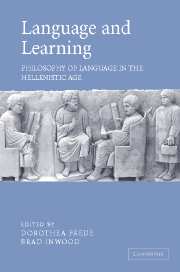Book contents
- Frontmatter
- Contents
- List of contributors
- Preface
- List of abbreviations
- Introduction
- 1 The Stoics on the origin of language and the foundations of etymology
- 2 Stoic linguistics, Plato's Cratylus, and Augustine's De dialectica
- 3 Epicurus and his predecessors on the origin of language
- 4 Lucretius on what language is not
- 5 Communicating Cynicism: Diogenes' gangsta rap
- 6 Common sense: concepts, definition and meaning in and out of the Stoa
- 7 Varro's anti-analogist
- 8 The Stoics on fallacies of equivocation
- 9 What is a disjunction?
- 10 Theories of language in the Hellenistic age and in the twelfth and thirteenth centuries
- References
- Index nominum et rerum
- Index locorum
Introduction
Published online by Cambridge University Press: 23 November 2009
- Frontmatter
- Contents
- List of contributors
- Preface
- List of abbreviations
- Introduction
- 1 The Stoics on the origin of language and the foundations of etymology
- 2 Stoic linguistics, Plato's Cratylus, and Augustine's De dialectica
- 3 Epicurus and his predecessors on the origin of language
- 4 Lucretius on what language is not
- 5 Communicating Cynicism: Diogenes' gangsta rap
- 6 Common sense: concepts, definition and meaning in and out of the Stoa
- 7 Varro's anti-analogist
- 8 The Stoics on fallacies of equivocation
- 9 What is a disjunction?
- 10 Theories of language in the Hellenistic age and in the twelfth and thirteenth centuries
- References
- Index nominum et rerum
- Index locorum
Summary
Despite the fact that Greek culture (and consequently Roman as well) was intensely language conscious, the systematic investigation of language, its origin, its structure, and its varieties was a relative late bloomer in the ancient world. This is bound to surprise us. To be sure, there were reflections on the relation between speech and its objects from early on among the poets, the Presocratic philosophers, and especially among the sophists, the first professional rhetoricians and teachers of ‘how to do things with words’. That such concern did not immediately lead to the development of language as a field of research seems to be due to several factors. Though the Greeks were aware of the existence of different languages, the acquisition of a foreign language was not part of even an elite education in the Greek world, but was left, rather, to professional interpreters. Furthermore, despite a great wealth of speculation on the origin of culture, language was not a major topic in those considerations. Though there is a host of stories of divine gifts of craftsmanship to human beings, including the civic virtues as a means of survival and the Promethean clandestine handing down of fire, there is no parallel depiction of a miraculous distribution of language to a miserable horde of speechless primitive men. The lack of a mythological account of the origin of language is certainly no accident in a religious culture that presupposes that there is a language common to gods and men: such a mythical background quite unreflectively presupposes that language has ‘always’ been around, even before the creation of humankind (if such a creation was part of the common lore).
- Type
- Chapter
- Information
- Language and LearningPhilosophy of Language in the Hellenistic Age, pp. 1 - 13Publisher: Cambridge University PressPrint publication year: 2005



